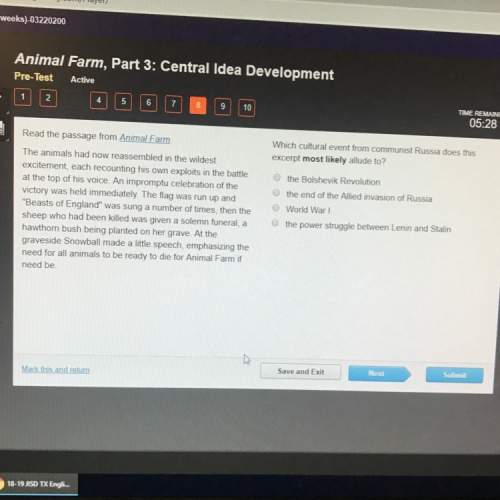
English, 25.10.2019 02:43 Zshotgun33
Read the following excerpt from levitt and dubner's freakonomics
there is a tale, "the ring of gyges," that feldman sometimes tells his economist friends. it comes from plato's
republic. a student named glaucon offered the story in response to a lesson by socrates-who, like adam smith,
argued that people are generally good even without enforcement. glaucon, like feldman's economist friends,
disagreed. he told of a shepherd named gyges who stumbled upon a secret cavern with a corpse inside that wore a
ring. when gyges put on the ring, he found that it made him invisible. with no one able to monitor his behavior,
gyges proceeded to do woeful things-seduce the queen, murder the king, and so on. glaucon's story posed a moral
question could any man resist the temptation of evil if he knew his acts could not be witnessed? glaucon seemed to
think the answer was no.
the excerpt serves as which of the following in relation to the authors' argument?
a) a claim that most people are moral
b) an example of morality in the workplace
c) a conclusion about morality in the workplace
d) a counterclaim to the idea that most people are moral

Answers: 1


Another question on English

English, 22.06.2019 10:30
What aspects of a story the reader understand the authors purpose
Answers: 2

English, 22.06.2019 11:30
Discussing the tom robinson case with uncle jack, atticus refers to “maycomb’s usual disease.” what does he mean? why doesn’t he suffer from it?
Answers: 3

English, 22.06.2019 14:00
Read the passage from the opinion of the court in dred scott v. sandford, written by justice taney. the question then arises, whether the provisions of the constitution, in relation to the personal rights and privileges to which the citizen of a state should be entitled, embraced the negro african race, at that time in this country, or who might afterwards be imported, who had then or should afterwards be made free in any state; and to put it in the power of a single state to make him a citizen of the united states, and endue him with the full rights of citizenship in every other state without their consent? does the constitution of the united states act upon him whenever he shall be made free under the laws of a state, and raised there to the rank of a citizen, and immediately clothe him with all the privileges of a citizen in every other state, and in its own courts? the court thinks the affirmative of these propositions cannot be maintained. and if it cannot, the plaintiff in error could not be a citizen of the state of missouri, within the meaning of the constitution of the united states, and, consequently, was not entitled to sue in its courts. what claim does justice taney make in this passage? that sanford has the right to enslave scott that scott has the right to be emancipated that scott is not a citizen of missouri that sanford cannot sue because he is not a citizen
Answers: 1

English, 22.06.2019 15:00
Write a compound-complex sentence describing the picture above.
Answers: 1
You know the right answer?
Read the following excerpt from levitt and dubner's freakonomics
there is a tale, "the ri...
there is a tale, "the ri...
Questions



Computers and Technology, 09.04.2020 05:05

Spanish, 09.04.2020 05:05

Chemistry, 09.04.2020 05:05


Computers and Technology, 09.04.2020 05:05

Mathematics, 09.04.2020 05:05

Mathematics, 09.04.2020 05:05



Biology, 09.04.2020 05:06







Mathematics, 09.04.2020 05:06




